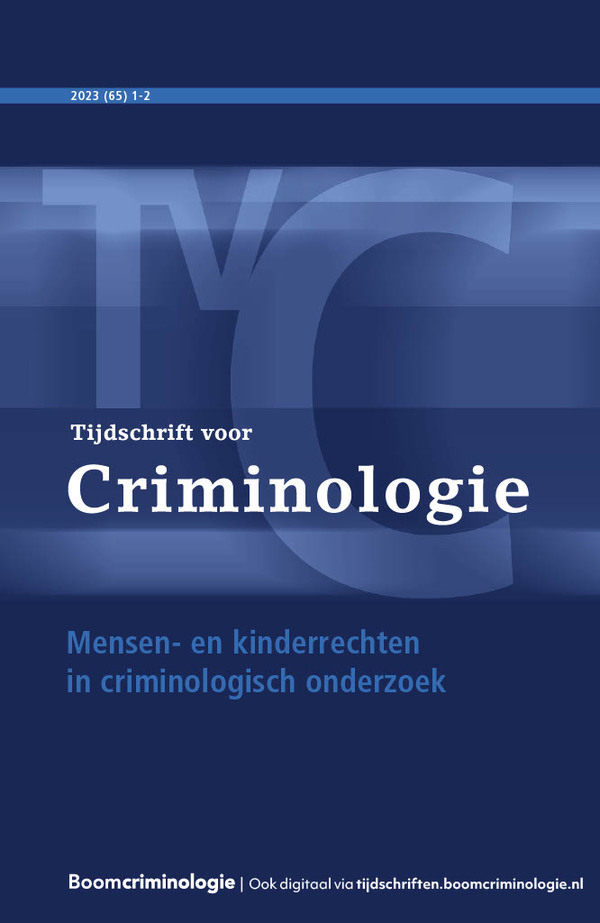|
There have been worldwide concerns that the COVID-19 restrictions have led to an increase in domestic violence. In this study the authors examine the domestic violence advices that have been registered by all 26 Veilig Thuis (Safe Home) regions in the Netherlands. To study potential differences in prevalence, suspected nature and the type of person that seeks advice on domestic violence prior and during the COVID-19 pandemic, the authors compare data from 2019 with 2020 and 2021. The findings show a general increase in advices in 2020 and 2021, that cannot be unambiguously attributed to the COVID-19 restrictions. |


Tijdschrift voor Criminologie
Meer op het gebied van Criminologie en veiligheid
Over dit tijdschriftMeld u zich hier aan voor de attendering op dit tijdschrift zodat u direct een mail ontvangt als er een nieuw digitaal nummer is verschenen en u de artikelen online kunt lezen.
| Redactioneel |
COVID-19 en criminaliteit |
| Auteurs | Tamar Fischer, Arjan Blokland en Veroni Eichelsheim |
| Auteursinformatie |
| Artikel |
|
| Trefwoorden | COVID-19 pandemic, lockdown, intimate partner violence, child abuse |
| Auteurs | Anniek Schlette, Anne Coomans, Sjoukje van Deuren e.a. |
| SamenvattingAuteursinformatie |
| Artikel |
Woninginbraken tijdens COVID-19: de performantie van een voorspellend criminaliteitsmodel in tijden van pandemie |
| Trefwoorden | predictive policing, crime pattern analysis, crime rates, big data, machine learning |
| Auteurs | Wim Hardyns en Robin Khalfa |
| SamenvattingAuteursinformatie |
|
In this contribution, the authors examine the spatiotemporal distribution of residential burglaries in a Belgian police zone based on monthly residential burglaries before and during the COVID-19 crisis and assess the performance of a predictive crime model during this period. In general, compared to 2019, there were fewer home burglaries in 2020 during the COVID-19 crisis. Except for a few changes, the spatial distribution of residential burglaries in 2020 is largely similar to that of residential burglaries in 2019. The authors observe that the predictive crime model performs significantly worse at the start of the pandemic and when severe measures are taken, but that the model’s performance then rises again after a few months as the algorithm becomes more proficient in adjusting itself to big societal changes. |
| Artikel |
Online jeugdcriminaliteit in coronatijdOntwikkelingen in zelfgerapporteerd daderschap, activiteiten en contacten met vrienden bij een hoogrisicogroep |
| Trefwoorden | Cybercriminaliteit, Gedigitaliseerde criminaliteit, Pandemie, Routineactiviteitentheorie, Unstructured socializing |
| Auteurs | Marleen Weulen Kranenbarg en Frank Weerman |
| SamenvattingAuteursinformatie |
|
At the start of the corona pandemic, many speculated that opportunities for online crime would increase due to the drastic lockdown measures, especially for young people. In this article we explore whether this was the case and whether this was related to changes in young people's daily lives. Using Routine Activity Theory and the unstructured socializing perspective, we expected that offline delinquency would decrease and online delinquency would increase due to a decrease in offline and an increase in online activities and contacts. We used a unique longitudinal dataset with self-report data, collected from a high-risk group of young people (N=289; age 13-25 years) in ICT education (secondary school and MBO). Results show that activities and contacts with friends changed as expected. Young people indicated that, on average, offline contacts and activities decreased, while online contacts and activities increased. Nevertheless, across all forms of crime, delinquency rates for many young people remained stable. Changes that did occur generally showed a decrease in delinquency. This was true even for the different forms of online delinquency (both cyber-dependent crime and cyber-enabled crime). Multinomial models show that changes in delinquency are partially related to changes in activities and contact with friends, but not entirely as we had expected based on criminological theory. Finally, we discuss the lessons (theoretical implications and future research) that we as criminologists can learn from the natural experiment of the corona pandemic. |
| Artikel |
Effectieve participatie in strafzaken via een beeldschermErvaringen van gedetineerden, advocaten en rechtbankverslaggevers tijdens de lockdown |
| Trefwoorden | remote justice, virtual court, courtroom design, access to court, communication |
| Auteurs | Sigrid van Wingerden en Gabry Vanderveen † |
| SamenvattingAuteursinformatie |
|
During the COVID-19 lockdown courts tried urgent criminal cases by using videoconferencing technology. Communicating via a screen affects what one can see, hear or feel. This article presents the findings of three different studies on the experiences with videoconferencing during the lockdown. A survey among lawyers, a survey among detainees and a Twitter search all indicate that the defendant’s right to effective participation was undermined: connectivity problems harmed the right to attend court and confidential communication between the defendant and his lawyer was impossible. |
| Boekbespreking |
Geweld tegen hulpverleners: de rol van psychologische kenmerken van de hulpverlener nader |
| Auteurs | Christophe Vandeviver |
| Auteursinformatie |
| Boekbespreking |
Toponderzoek naar eenoudergezinnen en crimineel gedrag |
| Auteurs | Paul Nieuwbeerta |
| Auteursinformatie |

